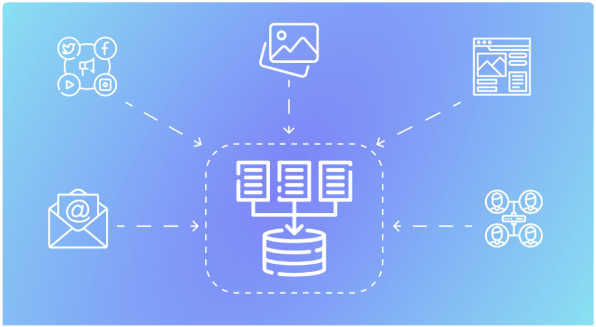Data archiving is the process of spotting data that is no more active and shifting it out of the production systems into long-term storage. Archived data is stored so that businesses can bring it back into use, anytime, as and when needed. The data archival strategy frees up the storage space for newer data, which is beneficial for businesses having limited resources. By archiving email, messages, files, and database records, businesses can free up space without risking regulatory violations or losing useful data that need to be utilized going forward.
While data archiving and data backup are often mentioned in the same breath, both these terms are actually used for totally different purposes. Archiving is for compliance, space management, risk aversion, and long-term retention. Backup, on the other hand, is for recovery from hardware breakdown or data loss, or corruption.
We’ve listed below some important steps to create data archiving strategies that make your move to holistic data storage as smooth as possible for your business:
Steps to Create Effective Data Archiving Startegy
Which Data to be Stored
To determine what must be stored and then consider what sort of data your business handles. For instance, do you want your emails discoverable? Then list them in your data inventory as searchable archive material.
Before you begin listing data to get archived, keep in mind, there is no universal guide to determine which data to archive. So, better sketch out a strategy with each division of your business, in tandem with your legal team, to dig up the safest and smartest course.
If you handle confidential client data, such as lawyers, healthcare practitioners, and real estate agents, you should be aware of the industry norms about the storage of particular data. For instance, HIPAA regulations require healthcare institutions to maintain patient information for a specified time frame based on each state’s guidelines.
You should archive the records of clients or patients who are no longer active, which is a fitting first step if you’re just beginning to carry out an archiving plan. While you need to maintain their records for legal reasons, their files are no longer active and don’t need constant backup.
Also Read: Best Practices for Healthcare Data Backup & Recovery
To keep everybody involved with your business in sync, devise an archive policy that entails a formalized and holistic stack of rules and processes. This document would contain:
Archive Policy Document
- Criteria for archiving data (which will likely vary for each data type)
- Duration of data storage
- Type of media used to store data (which, again, will be different based on the type)
- Mechanisms that drive the data filing procedure
- Rules for who can access the archived files and under what circumstances
As summarized above, devising a solid policy requires input from your business’s IT professionals and the data archive provider’s admins and app owners. The aim is to create a document that is manageable and enforceable and requires the authentication of your business’s annual review and legal counsel.
2. Choose Data Archival Service Provider
The security of your archived data must be a vital element while picking up a provider to manage your business’s critical data. As mentioned earlier, several industry norms require the safeguarding of specific data against damage and loss. This is where DLP or Data Loss Prevention strategy comes into the picture.
3. Encryption
Encryption is key to ensuring confidential files remain that way. Encryption lets you approve and limit access to specific information based on your employees’ roles and situations. This ensures that an end-user can’t tweak the archived data.
4. Secure Data Backup
You can also minimize data loss using a secure data backup through storage on remote servers. And, if the archived files ever need to get out of storage, they can be backed up whenever changes are made.
5. Audit
Furthermore, data backup should offer an auditing method that can notify you anytime somebody accesses – or attempts to access – your archived documents. This develops comprehensive audit logs for you to recollect whenever your archived data is put into question.
Before opting for any data archiving service, create a checklist of all the aspects you’re looking for to enjoy top-level data storage. Apart from what we’ve discussed above, you should look for services that come with:
- Multi-platform Support Software – Must work smoothly with popular applications and platforms.
- Search and Discovery Software – Must contain a systematic and flexible search engine to recollect archived information.
- Automated Backup – Must deliver automation capabilities that ensure data stays archived per the policy and no data is overlooked.
- Data Deduplication Engine – Must monitor duplicated data and replaces it with a reference that points to the original copy, thus increasing storage space.
A data archival strategy is a critical component of your data lifecycle management policy, offering you a way to restore data while staying within a feasible storage budget. Moreover, today’s data archival solutions have solid infrastructure and search abilities that let businesses easily find and restore relevant information whenever they want.
Having said that, surging data volumes and increasingly intricate regulatory frameworks have posed various challenges for IT pros tasked with managing data archiving on limited budgets.
A top choice for most businesses, Ace Data offers data archiving solutions that allow easy access to your archived data whenever you want while minimizing the archiving storage cost and streamlining regulatory adherence. For more information, get in touch with us today, and let’s talk.


